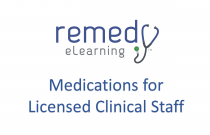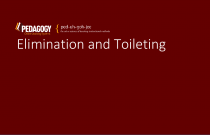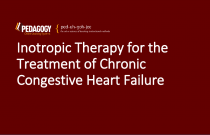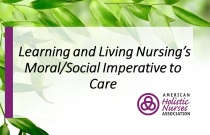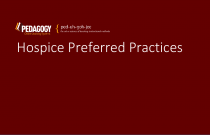HIPAA Privacy Law Update
U.S. Department of Health and Human Services, Jocelyn Samuels, Director Office of Civil Rights
1.00 Hours
This short course is based upon an update presented by the Department of Health and Human Services from it's National Conference held in 2003. HIPAA went into law in 1996 and has seen few changes or updates since that date.
EEG Principles
Medical Education Systems, Inc.
4.00 Hours
Electroencephalography is the neurophysiologic measurement of the electrical activity of the brain by recording from electrodes placed on the scalp or, in special cases, subdurally or in the cerebral cortex . The resulting traces are known as an electroencephalogram (EEG) and represent an electrical signal (postsynaptic potentia....
Guidelines for Field Triage of Injured Patients
Medical Education Systems, Inc.
6.00 Hours
At the scene of any crash or other event involving traumatic injury, emergency medical services (EMS) providers must identify those patients who are at greatest risk for severe injury and must determine the most appropriate facility to which to transport persons with different injury types and severities. This decision process i....
Influenza
Mohammed Ibrahim
Flu Immunisation is one of the most effective interventions immunisers can provide to reduce harm from flu and pressures on health and social care services during the winter. Increasing flu vaccine uptake in clinical risk groups is important because of increased risk of death and serious illness if people in these groups catch f....
Medications for Licensed Clinical Staff
Sheila Richmeier, MS, RN, FACMPE
1.00 Hours
In this course, you will gain an understanding of patient medication review, reconciliation and documentation, basic medication usage, and methods to communicate appropriate medication usage to patients. Information presented will help promote the awareness of the importance of understanding and communicating proper instructions....
Medical Ethics in Healthcare
Medical Education Systems, Inc.
3.00 Hours
In many ways, healthcare is an art and a scientific endeavor. Professionals try to act in ways that promotes the best health of the patient. But it is not always clear what is best for the patient. Thus at times choices have to be made that focus on what is best for the individual or their relatives, what medical records can be....
Factors Affecting Health of Women of Color
Industry Specialists
5.00 Hours
This CEU course examines the health care systems, the major diseases, and the barriers to accessing health care for women of American Indians / Alaska Natives, Native Hawaiians and other Pacific Islanders, Hispanics and Latinos, Blacks / African Americans, and Asian Americans.
Elimination and Toileting
Damion Keith Jenkins
2.50 Hours
This Elimination and Toileting course will provide participants with a review of the basic safety considerations and nursing care guidelines that help protect patients, residents and clients from complications related to elimination and toileting. This comprehensive review can be utilized throughout all healthcare settings, as t....
Clinical Leadership in Health Care for the Homeless
Industry Specialist
1.00 Hours
This CE course explores several aspects of clinical leadership in the practice setting, such as balancing clinical and administrative responsibilities, building internal and external relationships, delivering quality care, and directors’ need for training in practice management and leadership skills. *This course is not appro....
How to alleviate perineal pain following an episiotomy
Mary Steen and Bernie Cummins
An episiotomy increases maternal morbidity in the postnatal period. Alleviating perineal pain is an important aspect of maternal health care. A combination of pain relief methods, systemic and localised, may be required to alleviate perineal pain associated with an episiotomy. It is important that midwives and doctors advise....
How to care for a patient's eyes in critical care settings
Janet Marsden and Richard Davies
Eye care is an important aspect of the nursing management of patients who are critically ill. All patients in acute care settings with absent or compromised eye defence mechanisms are at risk of eye complications and ocular surface disease. This module aims to assist healthcare practitioners to care for the eyes of patients in c....
How to set up and use a Twitter account professionally
Meriel Chudleigh and Ray Jones
This article encourages nurses to use Twitter to engage in professional discussions, share information and raise awareness of alternative views to enhance practice and patient care. Twitter is an online social media service that enables users to send and read 140-character messages called tweets. Twitter is free and accessibl....
Emergency Severity
Shelly Walters RN, BSN, CEN
0.25 Hours
At the completion of this activity, participants will be able to properly triage patients in the emergency department.
Eating Disorders Basic Overview
Industry Specialist
1.00 Hours
This guide is published by the National Institute of Mental Health. It provides a very basic overview of what eating disorders are and what can be done to better understand and treat eating disorders. *This course is not approved for NBCC renewal.
Family Violence: Treatment of Perpetrators and Victims
Donald Meichenbaum, Ph.D.
2.00 Hours
This course was developed using an excellent paper written by Dr. Donald Meichenbaum, Distinguished Professor Emeritus at the University of Waterloo, Canada and Research Director of the Melissa Institute for Violence Prevention and Treatment in Miami, Florida. Dr. Meichenbaum covers topics such as risk factors, danger signs, ass....
Medical Errors for Mental Health Professionals
Food and Drug Administration Technical Expert/Advisory Panel
1.00 Hours
This course is a fusing together of a short FDA Medication Errors Guide and a more comprehensive paper detailing the scope, definition, investigation process and laws surrounding medical errors. Special emphasis is given to medical errors prevalent in the Mental and Behavioral health professions. The paper focuses on Florida but....
LGBTQ Youth, YMSM and YWSW Who Engage in Survival Sex
Meredith Dank, senior researcher, et al.
4.00 Hours
This CEU course describes and quantifies the sexual and physical health outcomes among LGBTQ youth, YMSM, and YWSW engaged in survival sex; assesses how many are using and abusing alcohol and drugs; and details youths’ access to and interactions with treatment and service providers.
Intensive Outpatient Treatment for People with Stimulant Use Disorders
Jeanne Obert, M.F.T, M.S.M., et al.; Substance Abuse and Mental Health Services Administration
7.00 Hours
This CE course provides a structured approach for treating adults who abuse or are dependent on stimulant drugs. The materials outlined are designed so that counselors can implement the Matrix treatment approach even without training.
Meaningful Use of Electronic Health Records
Industry Specialist
3.00 Hours
This CEU course provides those in health care with detailed information on: policy context for meaningful use of electronic health records; understanding meaningful use; rural health clinics and electronic health records adoption; overall population of rural health clinics; adoption of information technology by rural health clin....
Family Reunification - What the Evidence Shows
Industry Specialist
2.00 Hours
This CE course examines family reunification by reviewing the following strategies: family reunification in different States as determined by the Child and Family Services; family reunification as discussed in other literature sources; and examples of successes from the field. *This course is not approved for NBCC renewal.
Ins and Outs of Infection Prevention and Control
Industry Specialists
1.00 Hours
This course provides an overview of infection prevention and control (IPC) including: A brief history of IPC; Organizations that influence practice structure and function of an IPC program; As well as the roles and responsibilities of the Infection Preventionist.
Inotropic Therapy for the Treatment of Chronic Congestive Heart Failure
Pamela Clark
2.00 Hours
This instructional course has been designed to provide conceptual and operational knowledge to the licensed clinician interested in the provision of inotropic medications. Administration of these drugs is becoming more common as the population ages and pressure increases to reduce CHF-related hospitalizations. For the licensed c....
Learning and Living Nursing’s Moral/Social Imperative to Care
Deborah Shields, PhD, RN, CCRN, QTTT, AHN-BC and Margaret E. Erickson, PhD, APRN, CNS, APHN-BC
1.25 Hours
The purpose of this activity is to enable the learner to examine the steps taken by the American Holistic Nurses Credentialing Corporation and the American Holistic Nurses Association that assured the inclusion of the 5th role – Advanced Practice Holistic Nurse – into the Consensus Model.
Hospice Preferred Practices
William Storey
2.00 Hours
"An online continuing education course for administrators, nurses, medical health care professionals, and other interested individuals. Because of the complex needs of hospice and palliative care patients, clinicians must be able to construct a plan of care that will accurately chart a patient’s progress towards outcomes that....
Drug & Dietary Supplement Use Among Seniors
Chris Cole and Dima M. Qato, PharmD, MPH, PhD
0.50 Hours
Published research indicates that many older adults in the United States use prescription and over-the-counter (OTC) medications and dietary supplements, but this can increase their risks for polypharmacy and adverse drug events. Many medications that are commonly used by older adults, such as antiplatelets, anticoagulants, stat....


